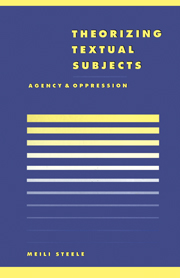Book contents
- Frontmatter
- Contents
- Acknowledgments
- Introduction
- 1 Stories of oppression and appeals to freedom
- 2 Language, ethics, and subjectivity in the liberal/communitarian debate
- 3 Theorizing narratives of agency and subjection
- 4 Truth, beauty, and goodness in James's The Ambassadors
- 5 The subject of democracy in the work of Ralph Ellison
- Conclusion
- Bibliography
- Index
1 - Stories of oppression and appeals to freedom
Published online by Cambridge University Press: 06 July 2010
- Frontmatter
- Contents
- Acknowledgments
- Introduction
- 1 Stories of oppression and appeals to freedom
- 2 Language, ethics, and subjectivity in the liberal/communitarian debate
- 3 Theorizing narratives of agency and subjection
- 4 Truth, beauty, and goodness in James's The Ambassadors
- 5 The subject of democracy in the work of Ralph Ellison
- Conclusion
- Bibliography
- Index
Summary
Any attempt to characterize and critique in one chapter the diversity of contemporary theoretical practices will require a tight focus and purpose. What drives the exposition in this chapter is a cluster of pervasive and crippling philosophical assumptions about subjectivity and value. My goal is to ferret out these assumptions, show their possibilities and weaknesses and then propose a new way for these theories to speak to each other within a democratic hermeneutics. What I mean by “democratic hermeneutics” will emerge only through the argument of the entire book, but the first step toward such an understanding is through a meta-critique of the theories that claim our attention today. My way of focusing this meta-critique will be the hermeneutic issue of explanation and understanding, in which third-person accounts of the subject must negotiate with first-/second-person accounts of agents. The theorists whom I will discuss below – Jacques Derrida, Michel Foucault, Jean-François Lyotard, Diana Fuss, Judith Butler, Jürgen Habermas, Fredric Jameson, and Barbara Smith – were selected not only because they are influential but also because the problems in their work fit together nicely around this hermeneutic dilemma. This approach will clarify how we can think about the competing vocabularies of determination and constitution that now collide in discussions about race and gender, as we saw in the citation from Henry Louis Gates in the Introduction.
- Type
- Chapter
- Information
- Theorising Textual SubjectsAgency and Oppression, pp. 15 - 61Publisher: Cambridge University PressPrint publication year: 1997



